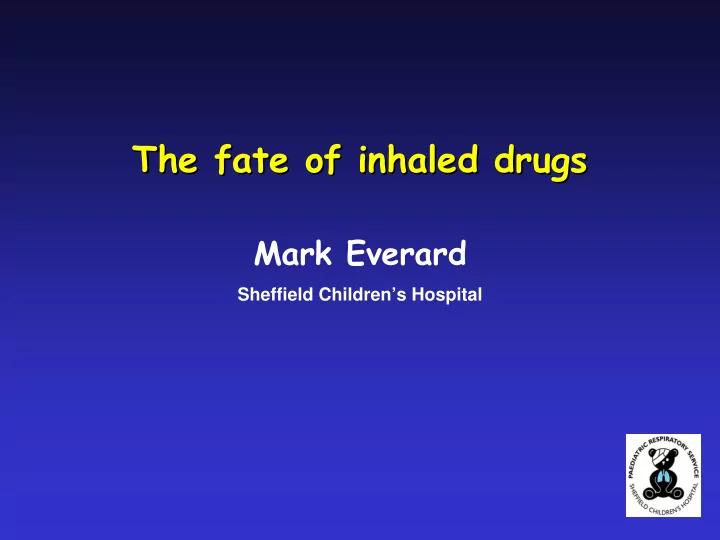

The fate of inhaled drugs The fate of inhaled drugs Mark Everard Sheffield Children’s Hospital
Why Used Inhaled Therapy? Drug is delivered directly to site of action Spahan JD, Szefler SJ Pediatric Respiratory Medicine 2008
Oral vs Inhaled therapy Fundamental differences � Lungs have evolved to exclude foreign material � Even if you take the medication you may not � Even if you take the medication you may not derive any benefit derive any benefit Compliance x 2 Compliance x 2 regimen compliance device compliance [competence + contrivance]
Inhaled Therapy for Pulmonary Disease Inhaled Therapy for Pulmonary Disease Speed of Onset Therapeutic Index Large luminal dose Webb J et al Br J Dis Chest 1982 Poorly absorbed drugs Inhaled Therapy for Systemic Therapy Inhaled Therapy for Systemic Therapy Very Large surface area
Inhaled Therapy Device / Formulation Therapeutic Drug effect
Inhaled Therapy -ISAM Therapeutic Drug effect Anatomy Fate of Disease Device Physiology drug Inter- subject variation Formulation issues Age Availability Generalised dependent Cost Target Variable Adverse Progressive Effects
Sources of Variability in Lung Dose Disease Compliance Competence Anatomy Device Drug Therapeutic Physiology Contrivance effect Adverse Effects Formulation issues Inter- Availability subject Cost Target variation Fixed Age dependent Progressive How Variable controlled?
Basic Principles Basic Principles Lungs have evolved to exclude foreign material Defences Defences Airways anatomy Airways anatomy Cough Mucocillary clearance Deposition Deposition Impaction Impaction Sedimentation Sedimentation Brownian motion
Energy Is Required for Aerosolisation Aerosolisation Energy Is Required for Jet nebuliser compressed air compressed air pMDI CFC / HFA Dry powder patient
Lung Dose Variability - - Healthy Adults Lung Dose Variability Healthy Adults Intra- Intra -subject subject ‘Most efficient’ Urinary Salbutamol ( μ g) CV% CV% pMDI 50.1 % 5.4 pMDI [27-146.8] [0.69-17.6] 7 pMDI+HC 31.7 % 11.6 7 pMDI+HC [20.1-87] [2.2-35.9] 2 Breath Actuated 33.4 % 8.8 2 Breath Actuated [10.5-61.9] [2.2-13.2] 3 Accuhaler/ / 39.6 % 9.6 3 Accuhaler Discus Discus [12.4-75.2] [4.1-14.7] 1 Turbohaler Turbohaler 42.4 % 7.5 1 [21.0-73.8] [2.6-17.6] Everard et al J Aerosols Med
450 Mill. Alveoli Surface Area of 150 m2 Diameter ¼ mm Gasex-change Area 80-90%
‘ Bacterial Chest Infections ’
Drug Delivery is Non- -Uniform Uniform Drug Delivery is Non
Distribution of Aerosol Deposition 40 Deposition per generation 35 30 25 20 15 10 5 0 0 5 10 15 20 25 Generation number 1.4 Deposition per unit volume 1.2 1 (%/ml) 0.8 0.6 0.4 0.2 0 0 5 10 15 20 25 Generation number Deposition per units surface 0.25 0.2 area (%/sq cm) 0.15 0.1 0.05 0 0 5 10 15 20 25 Generation number John Fleming, Southampton Martonen 2003
Does Breathing Pattern Matter?
Impact of Disease Impact of Disease - Asthma Laube B 1992 Martonen 2003
Impact of Disease Impact of Disease - Asthma
Impact of Disease Impact of Disease
Fate of Deposited Particles
Mucocillary Clearance & Absorption
Becker RHA 2006 Borgstrom 1992
Poor control vs Exacerbation Reddel H Lancet 1999
Biofilms
Bacterial Bronchitis inc CF, bronchiectasis, COPD
COPD and Insulin
Inhaled Therapy Therapeutic Drug effect Anatomy Fate of Disease Device Physiology drug Inter- subject variation Formulation issues Age Availability Generalised dependent Cost Target Variable Adverse Progressive Effects
Summary � We are taking on the forces of evolution, pathogens and disease [& regulators!] � Aerosol are best used in healthy individuals � Intervene early while you can effectively � Asthma is relatively easy
Recommend
More recommend